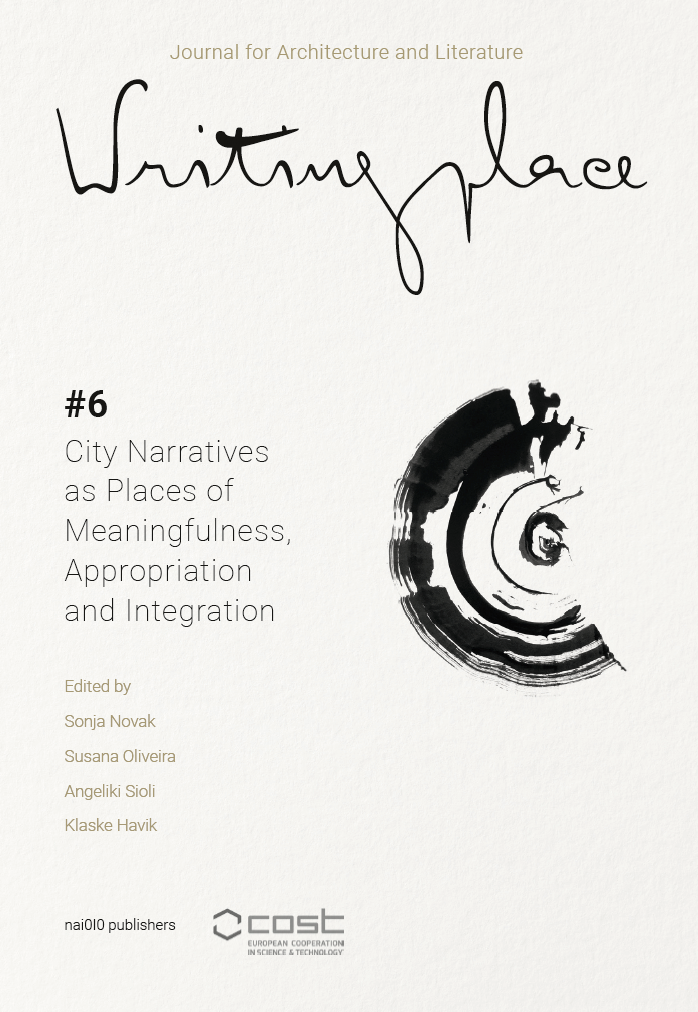Narratives of Appropriation
Abandoned Spaces, Entangled Stories and Profound Urban Transformations
DOI:
https://doi.org/10.7480/writingplace.6.6356Abstract
Based on a narrative inquiry, this article presents the stories of four women who are, individually and collectively, appropriating vacant and abandoned urban spaces, physically transforming them, providing them with new uses, while unleashing other processes that have the potential to lead to profound systemic transformations. Building on these stories, the article discusses the notion of appropriation, utilizing Henri Lefebvre’s writings. The key argument of the article is that, through the appropriation of these urban spaces, these women are asserting their right to the city and their right to challenge and participate in the processes of urbanization.
References
Nishant Kishore et al., ‘Mortality in Puerto Rico after Hurricane Maria’, The New England Journal of Medicine 379 (2018), 162-170.
Naomi Klein, ‘There’s Nothing Natural About Puerto Rico’s Disaster’, The Intercept, 21 September 2018.
Naomi Klein, The Battle for Paradise: Puerto Rico Takes On The Disaster Capitalists (Chicago, 2018).
US Census Bureau, Selected Housing Characteristics, Vacant Housing Units, 2019: ACS 1-Year Estimates Data Profiles, data.census.gov/cedsci/table?q=Puerto%20Rico%20Housing&tid=ACSDP1Y2019.DP04&hidePreview=false, accessed 11 March 2021.
Lexico English Dictionary (2021), definition of ‘appropriate’, lexico.com/definition/appropriate.
Chris Butler, ‘Exploring the Contours of the Right to the City: Abstraction, Appropriation and Utopia’, in: Michael E. Leary-Owhin and John P. McCarthy (eds.), The Routledge Handbook of Henri Lefebvre, The City and Urban Society (London/New York, 2019), 457-466.
Henri Lefebvre, The Production of Space (Oxford, 1991), 306.
Butler, ‘Exploring the Contours’, op. cit. (note 6), 458.
Lefebvre, The Production of Space, op. cit. (note 7), 380.
Catherine K. Riessman, Narrative Methods for the Human Sciences (Boston College, 2008), 3.
A thorough description of this process was published in: Dalia Milián Bernal, ‘Temporary Uses of Vacant and Abandoned Urban Spaces in Latin America: An Exploration’, Nordic Association of Architectural Research: Proceedings Series (2020).
Adele E. Clarke, Situational Analysis: Grounded Theory After the Postmodern Turn (Thousand Oaks, 2005); Kathy Charmaz, Constructing Grounded Theory: a Practical Guide through Qualitative Analysis (London, 2006).
Donald E. Polkinghorne, ‘Narrative Configuration in Qualitative Analysis’, International Journal of Qualitative Studies in Education 8 (1995).
Michelle Malley Campos, personal communication, 29 March 2018.
The team of Taller Creando Sin Encargos has grown throughout the years, in 2013 the team was joined by Irvis G. and in 2016 Irmaris S. became a new member. To learn more about their work, see: tallercreandosinencargos.tumblr.com/.
Omarya Rivera Crespo, personal communication, 23 March 2018.
Luis Gallardo, ‘Los estorbos públicos en Puerto Rico’, Revista Jurídica Universidad de Puerto Rico 116 (2018), 117.
A huerto is a small vegetable garden.
Marina Moscoso Arabía, personal communication, 6 March 2018.
The Asociación Residentes Machuchal Revive Inc. was registered on 16 October 2013. See: opencorporates.com/companies/pr/331376-121.
Gallardo, ‘Los estorbos públicos’, op. cit. (note 26), 150.
Marina Moscoso Arabía, ‘Carta Abiertal al Gobernador’, Casa Taft 169 (blog), 2016, casataft169.com/2016/07/18/carta-abierta-al-gobernador/.
Sofía Unanue, personal communication, 21 February 2018. For more information about La Maraña, visit: lamarana.org/.
Downloads
Published
How to Cite
Issue
Section
License
Copyright (c) 2022 Dalia Milián Bernalis

This work is licensed under a Creative Commons Attribution 4.0 International License.



